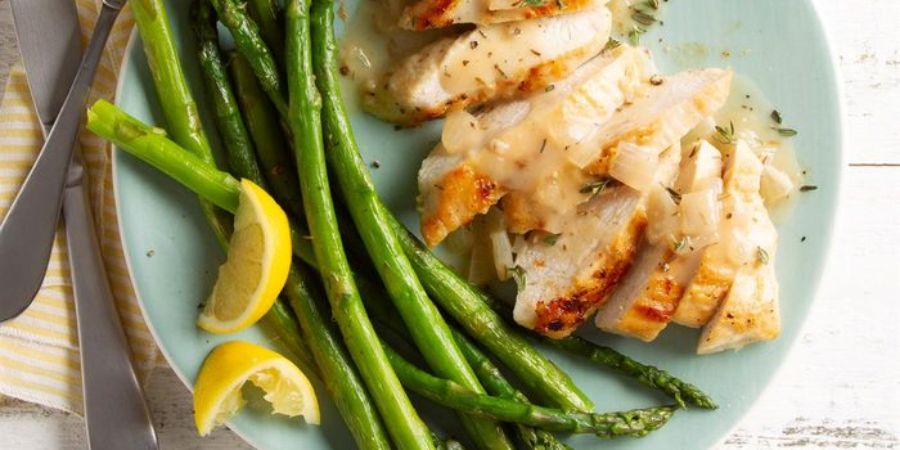

The addition of buttered onions to this simple lemon chicken recipe is fantastic. The chicken is lightly breaded and only needs a few minutes to brown on the stove.
3 tablespoons all-purpose flour, 1/2 teaspoon salt, and 1/4 teaspoon pepper are the ingredients.
4 boneless, skinless, 6-ounce pieces of chicken breast
Olive oil, two tablespoons
1 chopped medium onion
10 grams of butter
a half-teaspoon of dried thyme
3 tablespoons of lemon juice and 1 cup of chicken broth
2 teaspoons fresh thyme minced
Directions
Combine flour, salt, and pepper in a small bowl. For the sauce, set aside 4-1/2 teaspoons. Chicken should be covered with the remaining flour mixture on both sides.
Oil should be heated over medium heat in a sizable nonstick skillet. Cook the chicken for 7-9 minutes on each side, or until the juices run clear. Get rid of and keep warm.
Melt butter over medium-high heat in the same pan. Add onion; cook and stir for 3 to 5 minutes or until tender. Thyme and the saved flour mixture should be mixed together. Add the broth and lemon juice gradually while scraping away any browned bits from the pan's bottom. Bring to a boil; simmer and stir for 2 minutes or until thickened. over chicken, please. Add thyme to the mix.
Nutritional data
Using a half a chicken breast and 1/4 cup of sauce 308 calories, 14g fat (4g saturated fat), 103mg cholesterol, 647mg sodium, 8g carb (2g sugar, 1g fiber), and 36g protein make up this serving. Exchanges for diabetics: 5 lean meat, 2 fat, and 1/2 starch.
What's the deal with chicken and weight loss?
Although it has been linked to a lower risk of becoming overweight or obese (as part of a diet rich in vegetables), chicken isn't particularly magical for weight loss.
A high-protein diet may help you lose weight, according to research, and chicken may undoubtedly be a key component of any effort to increase your protein intake. Researchers believe that eating a high-protein diet can make you feel more satisfied, which will encourage you to eat fewer calories and carbohydrates at your next meal.According to a study, getting 25 to 30 g of protein every meal will help you lose weight, control your appetite, and improve your triglycerides, blood pressure, and waist circumference, which are all cardio metabolic risk factors.
But the method of cooking the chicken is important. Compared to deep frying or consuming highly processed chicken items (like chicken nuggets), cooking methods like baking, roasting, or grilling are far more weight-friendly.


